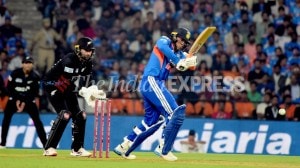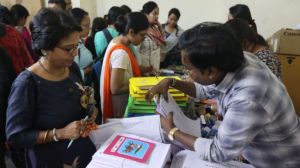Magical moments
If it was Geeta Dutt, our song for the New Year would have been Yellow main haari piya. But it was Asha Bhosle bringing in the New Year wi...

If it was Geeta Dutt, our song for the New Year would have been Yellow main haari piya. But it was Asha Bhosle bringing in the New Year with her live concert Eternal Asha 8211; Aaj Kal Hamesha in a flaming yellow sari.
Though she changed clothes several times, her demeanour remained guardedly ebullient, as though she wanted to savour those precious hours in front of a live audience before someone else snatched away the limelight.
There were several magical moments in the mercurial mega-event. Like Urmila Matondkar dancing to Ho Ja Rangeela Re all around Asha Bhosle while she just sang on, and even did a few steps with her nimble-footed companion.
Kajol too made a blush-rush-bas appearance for Zaraa sa jhoom loon main. And after singing the relatively rare Aao na galey lagaao na, Asha invited Helen on stage. The dancing diva demurred. We could see Rekha imploring the reclusive Helen to join the voice on stage that sang almost all her songs.
Finally Helen relented. It was a historic moment rendered doubly touching by Asha Bhosleacirc;euro;trade;s humility in admitting that a section of the audience was there just to see Helen. Come to think of it, the revival of interest in Helen was one of the great media occurrences of the year 2000. There were at least two major concert events in the last week of 2,000 celebrating the magic of Helen. While Husn Ke Laakhon Rang on Sony was a pretty haphazard happening with no sense of rhyme or reason, Golden Girls on DD2 telecast on New Yearacirc;euro;trade;s Eve was a befitting tribute to Helen with Urmila Matondkar, Aishwarya Rai and Twinkle Khanna replicating the costumes and dances with disarmingly high fidelity.
We had the original footage of Helenacirc;euro;trade;s dances juxtaposed with the homages for a comparative viewpoint. And todayacirc;euro;trade;s Golden Girls sure seemed to have done their homework. Just goes to prove, television is a medium which can no longer be taken for granted. Not when the cream of the crop from cinema are descending on the home-viewing medium without condescension or anxiety.
Shah Rukh Khan and Rani Mukerjee dazzled on Kaun Banega Crorepati, the former far more than the latter 8211; and Iacirc;euro;trade;m sure Rani who sat in the audience with Karan Johar looking on indulgently at Shah Rukhacirc;euro;trade;s dazzling performance, would be the first to agree that he was unbelievably magical. Shah Rukh joked, improvised, pouted and grinned. He did warm take-offs on Bachchan, as the Crorepati super-host looked on indulgently. Shah Rukh suddenly posed a question for the host about which of the five films 8211; Angeepath, Zanjeer, Sholay, Amar Akbar Anthony and Deewaar was the hostacirc;euro;trade;s favourite.
acirc;euro;oelig;If you push me against a Deewaar,acirc;euro; the Big B punned, acirc;euro;oelig;itacirc;euro;trade;ll have to be Deewaar. I believe such a script is unlikely to have been written.acirc;euro; Within less than an hour between them Amitabh Bachchan and Shah Rukh Khan established a bond of multiple Mohabbatein. Speaking of which Aditya Chopra turned Rani Mukerjeeacirc;euro;trade;s life line into a laugh line by pretending that he couldnacirc;euro;trade;t hear her question a fairly simple one for a filmmaker, about Raj Kapooracirc;euro;trade;s place of birth when just seconds before he was having normal conversations with both the host and the nervous acirc;euro;tilde;friendacirc;euro;trade; in the hotseat. Some friend. The memorable evening threw a lot of questions forward about the way we have started looking at home viewing entertainment post-Crorepati and the Big B. No more dimwitted gush-kha-ke interviews for us, thanks.
Arundhati Roy on BBCacirc;euro;trade;s Asia Today was as distanced from air-headed airplay as the Big B from the workaday movers and shakers on Indian television. Roy spoke passionately about how difficult it is to keep mum in the face of social injustices. Privatisation and building of dams are no-nos for this goddess of all small people.
But Arundhati wants to keep her mouth shut. But 8211; well, letacirc;euro;trade;s hear it Arundhati Royacirc;euro;trade;s own voice, acirc;euro;oelig;Every day your face is slammed up against that window pane. Every day as a writer, your aching eyes are opened and every day youacirc;euro;trade;re reminded that there have been societies in which terrible things are happening.acirc;euro; When Arundhati Roy spoke about the Common Man having a voice and space, she almost sounded like Shabana Azmi.
Standing tall and representing the woman of today is Smriti Malhotra. After becoming a household name as Tulsi in Kyunki Saas Bhi Kabhi Bahu Thi, she plays the title role of Kavita in DD2acirc;euro;trade;s Wednesday-night soap. Married into a rich and snobbish family, Kavita tries her best to please her nose-in-the-air mother-in-law Maya Alagh who has a bouquet sent to her bahuacirc;euro;trade;s hospitalised father. acirc;euro;oelig;You know I hate hospitals,acirc;euro; she tells her gentle son when he gently suggests that she pay the ailing gentleman a visit.
This is just the kind of woman who would sneer at a soap like Kavita at parties and secretly enjoy watching it. There was a mutedly melodramatic moment last week between Kavita and her father-in-law Gufi Paintal whoacirc;euro;trade;s well-meaning but unable to control his steamroller of a wife Om Prakash used to play such roles in the movies. When Kavita announces her decision to go back to work in order to pay back her fatheracirc;euro;trade;s hospital bills the father-in-law is horrified, then hurt and finally impressed. The dialogues are well written. When Kavita tells her incredibly supportive husband that heacirc;euro;trade;s a good soul he quips, acirc;euro;oelig;Yes I suffer from this congenital disorder paidayaishi defectacirc;euro;.
As part of the New Yearacirc;euro;trade;s eve binge, Roshan Abbas invited the cast of Siski and Kyunki Saas Bhi Kabhi Bahu Thi to play against each other on Mastercard Family Fortune. Poor Ketaki who plays the bahu from Junagarh in Kyunki8230; was embarrassed out of her wits when she was asked to speak in her characteracirc;euro;trade;s funny accent.
Must celebrity guests be asked to sing/recite/emote on talk shows and game shows? They are there not to air their art but to express their opinion or have a good time. On Star Plusacirc;euro;trade; Chalti Ka Naam Gaadi, poor Deepti Bhatnagar and Sweta Menon got no accompanying support from their male partners Subhash Ghai and David Dhawan when they valiantly tried to sing Koi nahin hai phir bhi hai mujhko8230; and Raat baqi8230;. These directors needed lessons in the spirit of sportsmanship and chivalry.
8212; Subhash K Jha
- 01
- 02
- 03
- 04
- 05































